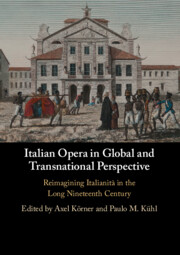 Italian Opera in Global and Transnational Perspective
Italian Opera in Global and Transnational Perspective Book contents
- Italian Opera in Global and Transnational Perspective
- Italian Opera in Global and Transnational Perspective
- Copyright page
- Contents
- Figures
- Tables
- Examples
- Notes on Contributors
- Preface and Acknowledgements
- 1 Opera and Italianità in Transnational and Global Perspective
- 2 Giving Singers a Voice
- 3 Nina d’Aubigny’s ‘Italian Voice’
- 4 Italian Opera and Creole Identities
- 5 Italian Opera in Vormärz Vienna
- 6 Southern Exchanges
- 7 ‘For a Moment, I Felt Like I Was Back in Italy’
- 8 Reimagining Rossini
- 9 From Heaven and Hell to the Grail Hall via Sant’Andrea della Valle
- 10 Arcadia Undone
- 11 Italian Impresarios, American Minstrels and Parsi Theatre
- 12 German National Identity and Operatic Italianità
- 13 (Opera) Fever in Belle Époque Manaus
- 14 Between ‘Sung Theatre’ and Asakusa Opera
- 15 Epilogue
- Index
4 - Italian Opera and Creole Identities
Manuel García in Independent Mexico (1826–1829)
Published online by Cambridge University Press: 17 March 2022
- Italian Opera in Global and Transnational Perspective
- Italian Opera in Global and Transnational Perspective
- Copyright page
- Contents
- Figures
- Tables
- Examples
- Notes on Contributors
- Preface and Acknowledgements
- 1 Opera and Italianità in Transnational and Global Perspective
- 2 Giving Singers a Voice
- 3 Nina d’Aubigny’s ‘Italian Voice’
- 4 Italian Opera and Creole Identities
- 5 Italian Opera in Vormärz Vienna
- 6 Southern Exchanges
- 7 ‘For a Moment, I Felt Like I Was Back in Italy’
- 8 Reimagining Rossini
- 9 From Heaven and Hell to the Grail Hall via Sant’Andrea della Valle
- 10 Arcadia Undone
- 11 Italian Impresarios, American Minstrels and Parsi Theatre
- 12 German National Identity and Operatic Italianità
- 13 (Opera) Fever in Belle Époque Manaus
- 14 Between ‘Sung Theatre’ and Asakusa Opera
- 15 Epilogue
- Index
Summary
Often studied as a transitory step towards the late consolidation of Italian opera in Mexico, the activities of the Spanish tenor and composer Manuel García in Mexico City from 1827 to 1829 call for a more nuanced analysis. The spatial reconceptualisation pursued by transnational and global histories as well as the redefinition of cultural borders triggered by postcolonial studies give us the tools to address García’s Mexican career as a key moment in terms of understanding the effects and issues raised by the spread of Italian opera in Latin America at the beginning of the nineteenth century. The chapter rethinks García's activities in Mexico City as comprising one of the first (while at the same time highly problematic) cultural encounters between Europe and the young Latin American nation after its emancipation from Spain (1821). Until then, mutual perceptions between Europe and Mexico were distorted by the intrusive cultural politics of imperial Spain. After independence, such misperceptions became more marked. Perceived as a familiar expressions of Europeanness, Italian opera became the arena where issues of identity and otherness were discussed. A close reading of the operas García composed for Mexican audiences will reveal how Italian opera changed by absorbing and reflecting the multiple postcolonial tensions of Mexico City.
Keywords
- Type
- Chapter
- Information
- Italian Opera in Global and Transnational PerspectiveReimagining Italianità in the Long Nineteenth Century, pp. 77 - 95Publisher: Cambridge University PressPrint publication year: 2022


